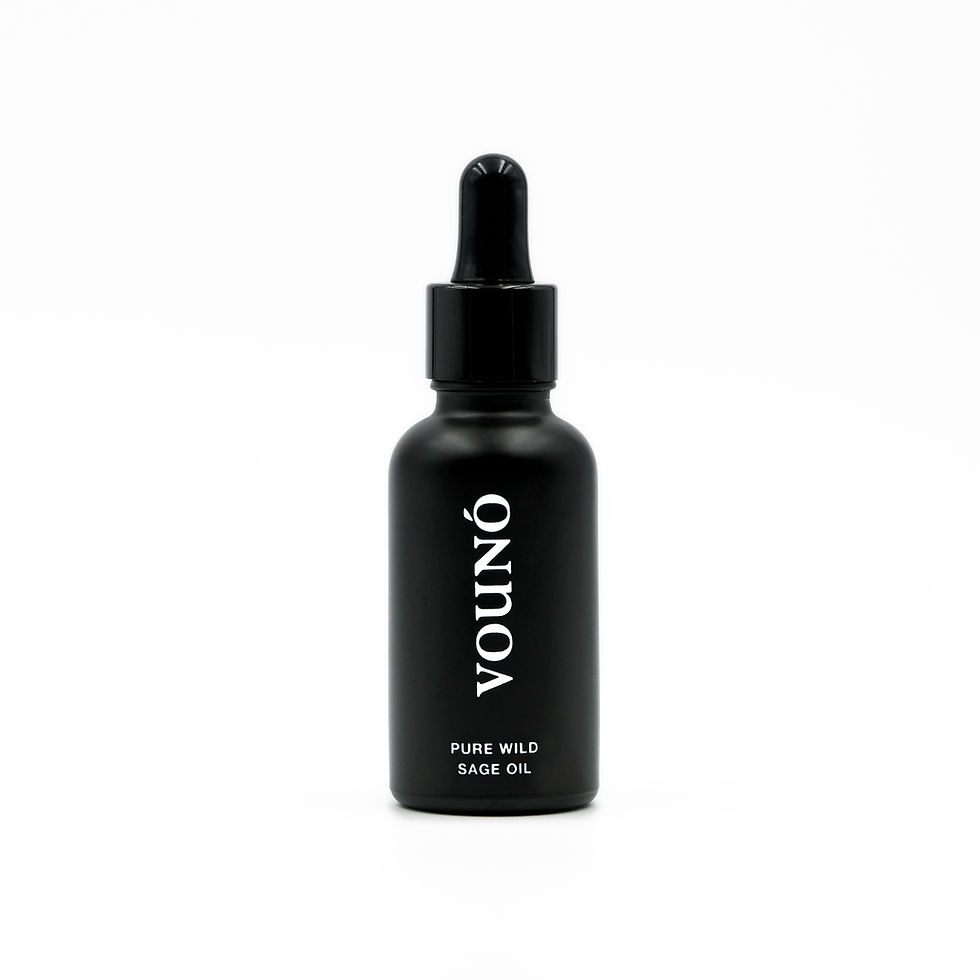Pure Artemisia Absinthium Oil
This remarkable oil promotes gut health and boasts powerful anti-parasitic properties, while offering neuroprotective effects and rich antioxidants to combat oxidative stress. Its unique formula helps regulate blood sugar levels, reduce inflammation, and provide strong antimicrobial and antifungal benefits. Elevate your wellness with our meticulously crafted, all-natural solution designed to support your overall health and vitality. Perfect for those who value high-quality, effective, and natural remedies, Vounó delivers excellence in every bottle.
Product Info
The oil, extracted from the flowering top of the plant and the leaves has an intense herbaceus aroma with sharp bitterness that dominates its scent profile. There is also a subtle hint of warmth, with spicy and woody nuances that add depth to its complex fragrance. It contains vitamin C, vitamin A and vitamin K, as well as compounds like flavonoids, and tannins which contribute to its medicinal properties, particularly for digestive and antimicrobial benefits.
Ingredients
OLEA EUROPAEA (extra virgin olive oil) from organic farming, Artemisia Absinthium from biodynamic farming, extract of flowers and leaves.
Steam-distilled.
No colorants, solvents, preservatives or additives.
Safety Considerations
Consult your healthcare professional before using this oil, especially if you are on any medications. Avoid if you have a history of seizures or take seizure medications. Monitor for side effects if combining with blood sugar-lowering or blood-thinning drugs. Do not use directly on or near the eyes. Please do not use the oils on children without consulting a qualified aromatherapist or doctor. Not indicated for use during pregnancy and breastfeeding. May interact with medications like sedatives (e.g., benzodiazepines, barbiturates, or sleep aids), central nervous system depressants (e.g., Valium, Ativan, Ambien), anti-seizure medications, anticoagulants (e.g., Aspirin), diabetes medications, statins, antidepressants.
Uses
One of the key uses of Artemisia Absinthium oil is in promoting digestive health. It has traditionally been used to treat digestive issues such as indigestion, bloating, nausea and constipation. It is also known for it antimicrobial and antifungal properties, making it useful in treating infections caused by bacteria or fungi, including skin infections and intestinal parasites. It has also been used for liver disorders.
It is widely used for its anti-parasitic effects. It was traditionally used to expel intestinal worms, such as tapeworms and roundworms. In addition to this, it is known for its analgesic and anti-inflammatory properties, and it has been used to relieve pain and reduce inflmmation, especially in conditions like arthritis or muscle pain.
Another use is for its potential cognitive and mental health benefits. It is believed to help improve mental clarity and treat conditions like depression and anxiety. Some studies suggest it may have neuroprotective effects and could potentially be useful in preventing conditions like Alzheimer's disease or dementia.
Used to relieve menstrual discomfort and regulate menstrual cycles due to its mild uterine stimulant properties.
Mechanism of Action
Artemisia Absinthium oil combats intestinal parasites within the digestive tract. It exhibits anti-inflammatory effects due to the presence of compounds like flavonoids and sesquiterpene lactones, which inhibit pro-inflammatory pathways by suppressing the production of inflammatory cytokines and enzymes like cyclooxygenase (COX). This reduces pain and inflammation, particularly in conditions like arthritis.
The oil is effective against bacteria and fungi, its antifungal properties may target fungal cell walls, reducing their ability to grow and replicate. Artemisia Absinthium oil stimulates the production of digestive enzymes and bile, improving digestion and alleviating gastrointestinal syntoms such as bloating and indigestion.
Some studies suggest that it may have anti-hyperglycemic effects (anti-diabetic activity), due to the antioxidant activity of the oil and its ability to enhance insuline sensitivity or inhibit enzymes like a-glucosidase, reducing carbohydrate breakdown and glucose absorption in the intestine.
The neuroprotective effects, seen in some studies, may be due to its antioxidant properties, which help protect neurons from oxidative damage. The flavonoids and polyphenols in the oil act as antioxidants by scaveging free radicals and reducing oxidative stress. This contributes to its potential benefits in chronic conditions such as inflammation, neurodegeneration, and possibly diabetes.
Historical notes
The common name comes from the German Wermut, "preserver of the mind," as the herb was reputed to enhance mental functions.
Moreover, the holy nature of wormwood is well established in ancient tradition. Pliny describes the ancient Roman custom of awarding a draught of wormwood to the winners of four-horsed chariot races, “doubtless,” Pliny says, “because our forefathers were of the opinion that good health was the most valuable reward they could bestow on their skill."















